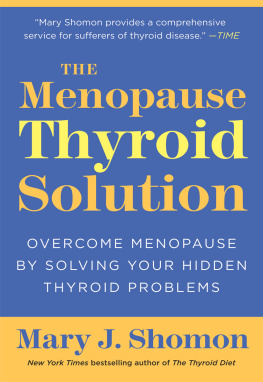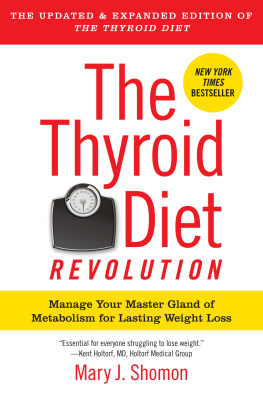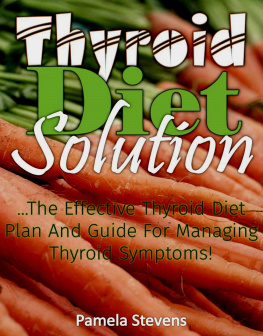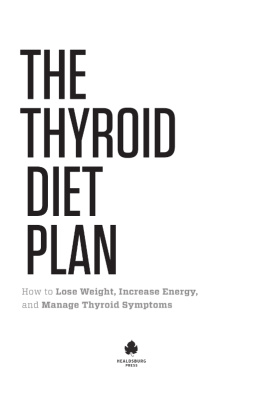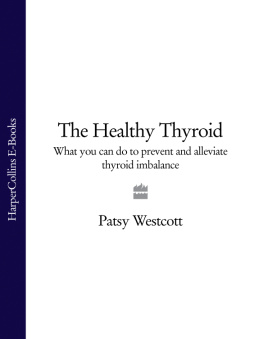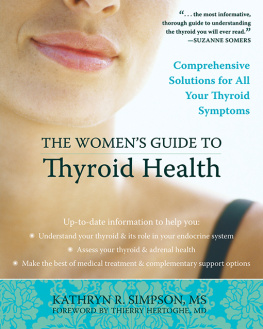There is no more creative force in the world than the menopausal woman with zest.
All adventures, especially into new territory, are scary.
Hmmmthe symptoms are fatique, weight gain, and memory problems. That sounds vaguely familiar.
Menopause and Thyroid
AN INTRODUCTION
After thirty, a body has a mind of its own.
Bette Midler
As a woman born in 1961 , Im lucky to be part of the generation of baby boomers who are likely to live well into our seventies or eighties. All of us want to get to that age feeling as healthy and energetic as possible. After all, were the generation that has come up with the popular mantras Fifty is the new forty, Sixty is the new fifty, and so on.
So here we are, living longer than ever. For many of us, our forties and fifties are a time when we are hitting our professional stride, our children are growing up and leaving home, and we can turn our attention to taking care of ourselves.
Why is it that just when youre coming into your own, it seems as if your body is falling apart?
You start gaining weight and feeling bloated. You find it harder to remember things and nearly impossible to concentrate. You notice your cholesterol level is going up, even though you havent changed your diet. Your moods shift quickly: sometimes youre anxious; other times you feel blue and depressed. Youre exhausted, but at bedtime, you feel restless and find it hard to sleep. You feel hot, then coldthe temperature is never right. Every time you shampoo or run a brush through your hair, a handful of hair comes out. Periods? Theyre erratic and unpredictable, and when they do come, theyre sometimes so heavy you cant even leave the house. And sex? Whats that?
So you jump to what seems like a logical conclusion: Menopause! (And if you dont assume it, your doctor will happily assume it for you.)
By menopause , Im actually taking some liberties with the term and talking about the whole perimenopause-into-menopause transition, a process that can sometimes take as long as eight to ten years. Many people use the terms menopause and perimenopause interchangeably to refer to the entire transition process. In this book, I actually do this too at times, even in the title, because, lets face it, were more likely to connect hot flashes, night sweats, erratic periods, and such with the idea of menopause. But apparently, 90 percent of us go through four to eight years of fluctuating hormones, erratic periods, and then, finally, that last menstrual period. Officially, the entire process is known as perimenopause or, less commonly, premenopause. Officially, menopause is confirmed when its been a year since your last period. After that last period, its postmenopause.
If you say Im going through menopause, and you are still having periods, then you are actually going through perimenopause. If youve stopped having periods for at least a year, you are technically postmenopausal.
You may not realize that by the time you are one year past your last menstrual period (again, menopause) your symptoms usually have improved and often have disappeared. Thats because its not the lack of hormones that causes symptoms in most women. Its actually the up-and-down fluctuations in hormones, as well as imbalances in the ratio of hormones, that take place in the months and years before that last period that cause the most troublesome symptoms.
Anyway, back to the symptoms. You start feeling exhausted, gain weight, become overheated, lose your hair, develop a low sex drive, and notice assorted aches and pains, so you assume youre in menopause. And off you go, to try to deal with it all.
You may start drinking soy smoothies, munching on soy burgers and edamame, and popping every menopause-manipulating herb available, from black cohosh to dong quai to chasteberry. Or you smear yourself with wild yam cream. Or you end up taking out a second mortgage to pay for complicated, compounded bioidentical hormone regimens. Or you head to the doctor, who sends you off with Premarin or Premprothe prescription conjugated estrogen drugs made from horse urinethen every time you take a pill, youre worried that youre increasing your risk for breast cancer or stroke.
And the saddest part of all? For some of you, none of this will help .
Why? Because its missing the point.
Youre forgetting what may be the most important hormone of all: thyroid hormone .
By age sixty, as many as half of all women have a slowdown in the thyroid, the master gland of metabolism and energy. And guess what the most common symptoms are? Fatigue, weight gain, depression, anxiety, menstrual irregularities, low sex drive, hair loss, and brain fog/memory problems.
So when you and your doctor assume that your symptoms are hormonal, you may be partially right, but the critical hormone youre overlooking may be thyroid hormone.
The natural decline of estrogen and progesterone that occurs in women starting in our late thirtiesand which is happening now to millions of American womenis one of the most common triggers of a thyroid slowdown. The shocker is that the millions of baby boomers who are in thyroid slowdown are not even diagnosed .
Instead, these womenand their doctorsare assuming they are menopausal. These women then spend thousands of dollars a year on appointments, pills, and potions to try to stave off menopausal symptoms and never get thyroid tests.
A near epidemic is being overlooked in this, an otherwise empowered, informed generation of women.
Thats why we need a solution: The Menopause Thyroid Solution.
Why are baby boomer and menopausal women at such a risk for thyroid problems? There are actually several key reasons.
- - First, thyroid problems are simply more prevalent as we age. Like many organs, the thyroid tends to slow down as we get older. So, as we age, we are generally at greater risk of developing thyroid problems.
- - Second, busy baby boomer women frequently face a high degree of physical stressimproper diet, lack of exercise, not enough sleep, exposures to toxinsas well as emotional and life stresses. Chronic stress causes the adrenal glands to ramp up production of stress hormones. There are limited raw materials to produce hormones, and the body considers survival more important than thyroid function, so chronic stress shifts production away from making thyroid hormone and toward making stress hormones. Eventually, if you push the adrenals long enough, adrenal fatigue sets in, which puts even more strain on the thyroid.
- - Third, hormone fluctuations during this period can affect the thyroid. When the ratio of estrogen to progesterone becomes imbalanced, even if both hormones are declining, a situation known as estrogen dominance can develop. Estrogen dominance can prevent thyroid hormone molecules from properly binding with receptors, making thyroid hormone unavailable to your cells, and leaves you functionally hypothyroid at the cellular level.

